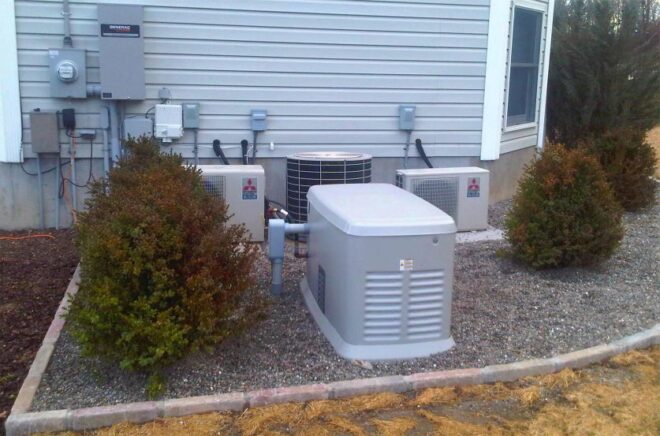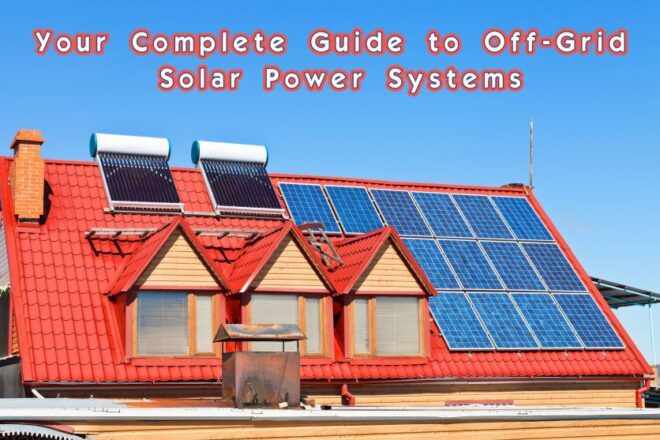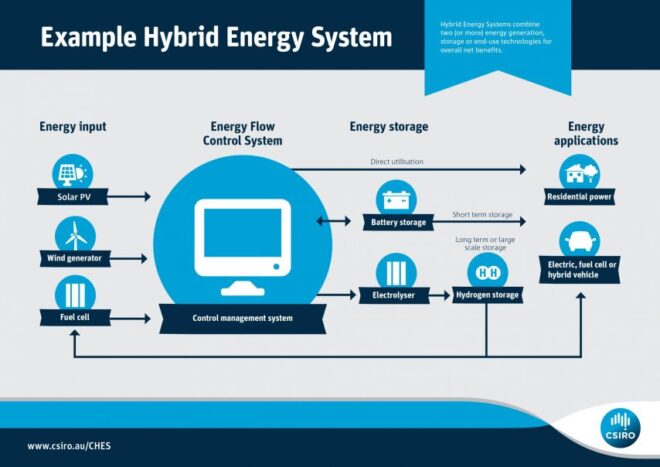Last updated May 26, 2023
Solar power is a viable option for many people, whether it’s in an urban area or somewhere isolated and rural.
An off grid solar system comes with its own set of benefits that are worth exploring, and it’s important that you learn about how these systems work. If you want to go solar but live in the country, this is certainly one option that you will need to get as much information as possible on before making a decision.
How do Off-Grid Solar Systems Work?
Many people who live in remote areas of the country use off-grid systems, making them their own power companies.
A person can be off the grid in the middle of a bustling city or way out in the countryside. These systems are completely self-sustaining and do not rely on an electrical grid to generate power for a home.
The term “off-grid” simply means that there is no traditional electrical grid.
www.oursolarenergy.com
Benefits of Going Off-Grid
There are many different reasons that a person might choose to use an off-grid solar system, but sometimes it is done out of necessity. Depending on how remote of an area it is, connecting to a local utility grid might not even be an option at all, or it could be too expensive.
Going off-grid can be a much cheaper and more efficient way to power one’s home. A lot of people who use these systems often have a backup generator just in case their renewable energy source cannot meet their power requirements in full.

One of the main reasons that people decide to use off grid solar systems is because it reduces their dependence on the electrical utility, as they generate all the power they need themselves.
Off-grid systems are usually bigger and more complex than grid-ties, which can present certain problems initially. If an off-grid system is installed correctly, it can save the homeowner thousands of dollars over the years.
Drawbacks of Off-Grid Solar Systems
There are some drawbacks associated with off-grid solar systems that you should take into consideration before making up your mind.
One of the disadvantages of this type of setup is that there will most likely be an adjustment period. You won’t be able to use power the exact same way as you did before, which is something that a lot of people don’t like.
There is also the fact that off-grid solar systems can be very expensive to implement initially, and not everyone has the money to do this. There are numerous ways to save money on an off-grid solar system, and it is highly recommended that you look into some of them.
Related: The Most Efficient Solar Panels Currently Available on the Market
Components of an Off-Grid Solar System
There are a few key components of off-grid solar systems that you should know about if you are planning on using one for your home.
These components include:
- Charge controller: This component is responsible for determining the amount of current that is put into the batteries for ideal performance. It also determines the overall efficiency of the system, so it is extremely important.
- Battery bank: The battery bank is another important component in an off-grid system, as there will inevitably be periods of time with little to no sunlight. This component ensures that the system keeps working at night or when the sun isn’t shining.
- Connected load: Completes the electrical circuit so that electricity is able to flow throw unobstructed.
- Transfer switch: Anyone who is using a backup generator with their off-grid solar system will need a transfer switch as well. The transfer switch allows you to go back and forth between these two power sources. If the solar system is backed by a generator, the transfer switch will allow you to select with source of electricity you want to use at any given time.
- AC load center: The AC load center allows you to maintain the required AC voltage at all times, and it is made up of numerous fuses, circuit breakers and switches.
- DC load center: The DC load center is basically the same as the AC load center, except for the fact that it allows you to maintain proper DC voltage at all times.
- DC-AC inverter: This device converts direct current to alternating current. Solar systems generate DC electricity, but a majority of home appliances need AC power. This inverter ensures that you get the specific type of electricity you require to power your appliances.
- Solar panels: These are a basic component of all solar systems. Also known as photovoltaic cells, these panels work together to create a solar array that absorbs sunlight and converts it into useable electricity for your home. Each of the PV cells are connected within the panel and to other panels with the use of cabling. These panels can actually generate energy even when it is cloudy outside and the sun isn’t shining.

Off-grid solar systems use a standard power converter instead of a traditional grid-tied inverter. These setups also sometimes use an off-grid solar inverter for powering AC appliances. There are also a number of optional components that can be used with these solar systems, including a backup generator, a transfer switch, AC load center, and DC load center.
Read more: Solar Panel System Installation: What You Should Know
Hybrid Systems
A hybrid system can be an ideal solution for those who are currently connected to an electricity grid but want to utilize battery storage too. This type of system will allow you to store solar energy that is generated during the daylight hours so you can use it even at night. Once all of the stored energy is gone, the grid will act as a backup.
This means that you can enjoy the best of both worlds, and it’s an option that more and more people are taking advantage of. One of the best things about these hybrid systems is that they use off-peak electricity to charge the batteries, which is significantly cheaper than electricity generated in the day.

The battery bank is a key component of a hybrid solar power system. When all of the solar power has been used up by your appliances, the rest of the power will go the battery. Once the battery is topped off, it will no longer receive power from the solar system.
There is also the meter and electricity grid, which also play a crucial part in a hybrid system. When your batteries have charged up all the way, all of the power that your appliances don’t need can be sent back to the grid through your meter. This means that when you are not using your solar system and your batteries don’t have any power, you will get what you need from the grid.
Off-Grid vs. Hybrid
When you are trying to decide whether to go hybrid or completely off-grid, there are a few things that you should take into consideration. Those who want to retain their independence completely should probably select the off-grid option.
If you are okay with being part of the electrical grid but still want to take advantage of what solar has to offer, hybrid is the way to go. One of the main reasons that so many people are obsessed with hybrid solar systems is because they offer the best of both worlds.
Before You Go Off Grid
Anyone who is thinking about going off-grid will first need to consider their own power usage along with how the system works as a whole. You will probably need to make certain adjustments to when you use electricity and how you use it.
There might be certain limitations that you are not accustomed to, so you will have to keep that in mind. You should take the time to run the numbers and calculate how much power you use at different times of the day and year, as this will be important.
It is also a good idea to speak with some people who have already chosen to go off-grid so that you will be able to get a better idea as to what you are in for. Some people decide to start using an off-grid solar system without doing this research first, and they end up regretting their choice as a result. When you take the time to talk to others who have done this, you will be able to get a better sense as to what it’s going to be like.
Conclusion
Off-grid solar systems are a miracle of modern technology, and they have helped a lot of people who live in remote areas where being connected to an electrical grid is either impossible or ridiculously pricey.
If you find yourself in this situation, it is important that you look into off-grid solar systems before making any sort of decision. There is a solar power solution for almost everyone no matter where they live. The more you learn about these options, the easier it will be for you to choose one that will match all of your needs perfectly.
